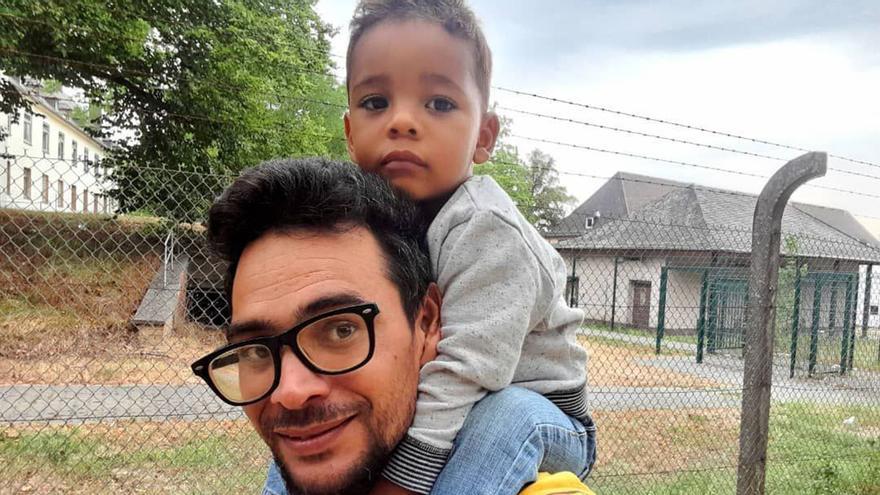
![]() 14ymedio, Havana, 1 September 2022 — Independent journalist and collaborator of 14ymedio Ricardo Fernández has been in Germany with his family since last July waiting for political asylum. The reporter, who suffered an intense siege from the political police, recognizes that so much pressure has left him with a damaged soul.
14ymedio, Havana, 1 September 2022 — Independent journalist and collaborator of 14ymedio Ricardo Fernández has been in Germany with his family since last July waiting for political asylum. The reporter, who suffered an intense siege from the political police, recognizes that so much pressure has left him with a damaged soul.
Fernández has lived through years of harassment and arbitrary arrests. Now, from a refugee camp in Zirndorf in the state of Bavaria, he details the pressures he felt in recent months. “Until that moment I had been the one who had put myself at risk for my ideals, but since the beginning of 2022, the new objective of State Security was my wife, my mother-in-law and my eldest daughter.”
By the month of May, “the situation had already become unsustainable, and I couldn’t sacrifice my family members for a struggle that they didn’t choose.” Fernández recognizes that he didn’t have the “right to offer the lives of others” because of his personal determination to practice independent journalism under a regime allergic to freedom of information.
Once the decision was made to leave the Island, they began the procedures to obtain passports and put family matters in order. “When State Security learned that we were in that process, the harassment multiplied.” A three-hour arrest at the third Camagüey Police Unit, on July 14, confirmed the need to leave as soon as possible.
It was not the first time the reporter was arrested. In July 2019, he spent nine days in a dungeon for the simple fact of visiting the headquarters of the Ladies in White Movement in the Havana neighborhood of Lawton. From that arrest he came out with a warning report for being “illegal” in the Cuban capital, a document that he refused to sign. Last July, he also received new threats.
“I was given the ultimatum that I had a month to leave the country. I am sure that in previous years they would not have told me that way, because I would have categorically denied it, but when they saw me start the process they threw themselves at me like dogs against an injured animal.” Even so, the political police retained the family’s passports and only handed them over at the end of July.
Boarding the plane, feeling it take off and flying over the Atlantic were bittersweet moments for Fernández, his wife and his three children. On the one hand, they felt relief at leaving the police threats behind, but on the other, the question opened up to them of what would become of their lives from that day on. They didn’t carry a single euro with them.
“The asylum process in Germany, after being approved by the police authorities in charge of carrying out the express deportation of those who cannot present evidence of persecution, is quite simple, and the organization is impressive,” he explains to this newspaper. “There is a large volume of requests for refuge, mainly from Ukrainian families fleeing the war.”
In the refugee center where the reporter is waiting for a response to his case, there aren’t a lot of Cubans. The days take place there in a peculiar way: “Because of the difference in schedule with Cuba and the desire to talk to our loved ones, there is little sleep at night. During the day we are engaged in adapting to this reality.”
Although the surprises before everything new seem to have no end, Fernández and his relatives have also realized that they are “broken inside.” “When we meet to share a coffee, strained precariously, we laugh at our own wounds and compare the hoarding habits that we carry in our souls.”
“Some keep boxes of bottled water; others sleep with the goodies that they accumulate. Everyone stores what they can as if there were no more tomorrow. That’s what we laugh at, avoiding the issues that break our souls. Finally, night comes and everyone retires to connect with their loved ones who were left behind.”
Now, the emergency list is very clear to the reporter: “My priority is to get my family to heal from the psychological damage it has suffered for years of persecution, while supporting my homeland in everything that can serve it.” In the midst of the uncertainty of what will happen to him and his family in the coming days, he avoids thinking of an option in which he doesn’t receive asylum and bets that “the hope of a life in peace will flourish.”
Translated by Regina Anavy
____________
COLLABORATE WITH OUR WORK: The 14ymedio team is committed to practicing serious journalism that reflects Cuba’s reality in all its depth. Thank you for joining us on this long journey. We invite you to continue supporting us by becoming a member of 14ymedio now. Together we can continue transforming journalism in Cuba.
